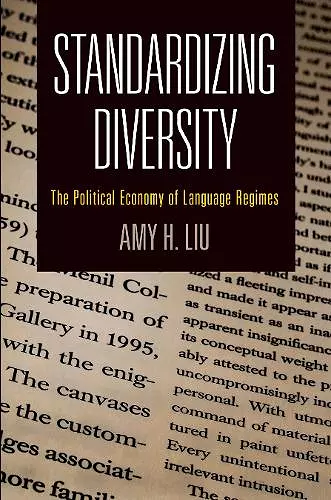Standardizing Diversity
The Political Economy of Language Regimes
Format:Hardback
Publisher:University of Pennsylvania Press
Published:14th Jan '15
Currently unavailable, and unfortunately no date known when it will be back

Using a newly assembled dataset and drawing on fieldwork data from Malaysia and Singapore, Liu finds that how linguistic power is distributed—specifically whether a lingua franca is recognized exclusively or above all others—can generate social trust, attract foreign investment, and therefore indirectly promote economic growth.
Using a newly assembled dataset and drawing on fieldwork data from Malaysia and Singapore, Liu finds that how linguistic power is distributed-specifically whether a lingua franca is recognized exclusively or above all others-can generate social trust, attract foreign investment, and therefore indirectly promote economic growth.
Languages have deep political significance beyond communication: a common language can strengthen cultural bonds and social trust, or it may exacerbate cultural differences and power imbalances. Language regimes that emerge from political bargains can centralize power by favoring the language of one ethnolinguistic group, share power by recognizing multiple mother tongues, or neutralize power through the use of a lingua franca. Cultural egoism, communicative efficiency, or collective equality determines the choice. As Amy H. Liu demonstrates, the conditions surrounding the choice of a language regime also have a number of implications for a nation's economy.
Standardizing Diversity examines the relationship between the distribution of linguistic power and economic growth. Using a newly assembled dataset of all language-in-education policies in Asia from 1945 to 2005 and drawing on fieldwork data from Malaysia and Singapore, Liu shows language regimes that recognize a lingua franca exclusively—or at least above all others—tend to develop social trust, attract foreign investment, and stimulate economic growth. Particularly at high levels of heterogeneity, the recognition of a lingua franca fosters equality and facilitates efficiency. Her findings challenge the prevailing belief that linguistic diversity inhibits economic growth, suggesting instead that governments in even the most ethnically heterogeneous countries have institutional tools to standardize their diversity and to thrive economically.
"A superb book, providing a richly documented, carefully reasoned, and innovative analysis of the economic imperative in the choice of language regimes. Addressing criteria of stability, efficiency, and inclusivity, and focusing especially on Asia, Amy Liu makes a convincing case for the role of lingua francas in power sharing and power neutralizing in multiethnic societies. It is a major contribution to the comparative study of the politics of language." * William Safran, University of Colorado at Boulder *
ISBN: 9780812246728
Dimensions: unknown
Weight: unknown
264 pages